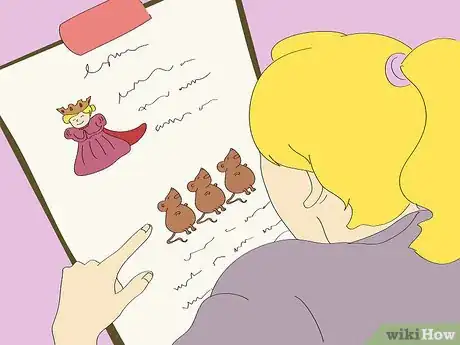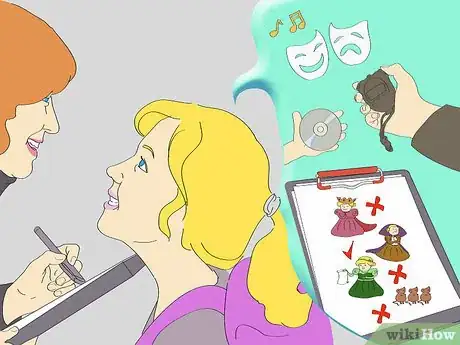This article was co-authored by Ben Whitehair. Ben Whitehair is a Social Media Expert and the Chief Operating Officer (COO) of TSMA Consulting. With over a decade of experience in the social media space, he specializes in leveraging social media for business and building relationships. He also focuses on social media’s impact on the entertainment industry. Ben graduated summa cum laude from The University of Colorado at Boulder with BAs in Theatre and Political Science as well as a Leadership Certificate. In addition to his work as CIO, Ben is a certified business and mindset coach and National Board Member of SAG-AFTRA. He is also a successful entrepreneur as the Co-Founder of Working.Actor, the premier business academy and coaching community for actors.
wikiHow marks an article as reader-approved once it receives enough positive feedback. In this case, several readers have written to tell us that this article was helpful to them, earning it our reader-approved status.
This article has been viewed 87,832 times.
If you always had the desire to be an actor or actress, the way to start is by volunteering to be in a school play. If your voice is not that great, there are talking parts, even if it is a 'musical.' Check to see when they are auditioning for a school play, and make sure you sign up.
Steps
-
1Find out the name of the musical and either find a script, movie or CD to give you a full understanding of the types of characters involved. Try to meet the director and tell them about your interests, training and desires.
-
2Choose two characters you think you could play well. You don't necessarily need to love a character to play them well.Advertisement
-
3Remember not to limit yourself to starring roles. They take more effort and more memorizing, and if you are a beginner, it might be too much for you to handle. Many actresses started small, but were noticed in minor roles by talent scouts.
-
4Ask yourself why you chose these two characters or the main one and write your answer in a pad. It might be helpful to you later, if you get either of the parts.
-
5Find out the specific date/time of your audition and the scheduled performance dates so you'll know if you have anything that will interfere with the shows. This will also tell you how long you have to practice.
-
6Ask how the audition process will go. Here are some good questions.
- Do you need to have a song or monologue prepared?
- How long will the audition take?
- What roles are available?
- Will there be accompaniment or do you have to bring in a karaoke CD?
-
7Pick a song that's right for your voice type and show you are auditioning for. Don't sing anything like rap or a rock song because it is a major turnoff for a casting director (unless that is what they're looking for.) If the show is something energetic such as Legally Blonde the Musical, you'll want to do an upbeat musical theatre song, not a ballad. Usually, they'll ask for about 16 measures (they can be 16 measures in a row that show off your range the best). Make sure it fits your range.
- At other times you'll be given a song. In that case you will probably get it beforehand, if you don't ask.
-
8If a monologue is required, find something you can connect with. It doesn't have to be well-known, and if you mess up, don't let the directors know. Make something up, and when you remember the correct lines, begin to get back on track.
-
9Dance. If you aren't the best dancer, pretend to be. Sometimes personality can make up for your terrible dance moves. Always try your best and don't get discouraged if people move really fast. Smile!
-
10Remain confident and friendly. Often, the director(s) will not show much reaction to your performance, but that doesn't mean they aren't paying attention. If they cut you off midway through a song or monologue, it means they have heard enough to judge you on, not that you're bad.
-
11Never do the following things.
- Apologize
- Stammer
- Flinch
- Prattle
- Stare into the director's eyes
- Squeal
- Try to make conversation
- Beg
- Brag
- Kiss up/compliment
- Go overboard
- Scurry in/scurry out
- Act overly excited or hyper
- Act sluggish or bored
- Exhibit any obnoxious behavior
-
12Always portray yourself as poised, confident, calm, and happy. However, don't be too perky, that can come off as desperate and annoying. Think of it as a showcase of your talent or a show you're putting on- that can help.
-
13Try not to be disappointed if you are placed in the chorus or ensemble. It's fun! In musicals, the ensemble makes up most of the cast. Extras require less rehearsal time, and they have more dancing, singing, costumes, scenes, and general camaraderie, not to mention they don't have to worry about forgetting a thousand lines.
-
14Remember- sometimes, these things are unfair. Just because you didn't get a part doesn't always mean you don't deserve it, or that you are less talented than the person who did. Accept whatever happens with grace and never demand another audition. Always be kind and respectful to the directors, and the person who got the part you wanted, even if you are cursing at them inside. But try to avoid that too.
-
15Get in touch with the main characters. Most tryouts are for main parts only - i.e., they're going to ask you to do a scene between the two lovebirds or a monologue for the main character of your gender.
-
16Think about the details for the character you're playing.
- Does your character have an accent? If so, should you try to replicate it?
- Is the character messy or neat?
- Does he/she have a spring in his step or does he/she mope around?
- Is he/she mischievous?
- Does he/she say lines confidently or is he/she less confident?
- When asked beforehand, these kinds of questions can give you a head start.
-
17You will always be nervous before an audition. This can be good, because it gives you the adrenaline boost you need. The most important thing is to channel that energy into your performance.
- If you are too nervous, you will need to calm yourself down. Deep breathing helps some people, so does biting your tongue, or shaking yourself. Different things work for different people. It doesn't matter how nervous you are, you need to make sure the other people who are auditioning can't tell. Be an actor and hide it. Directors will 'take into account' that you are petrified, because if they assume that if you can't act in front of three people, you won't be able to do it in front of a hundred. Whether this is true or not doesn't matter in an audition setting -- hide it.
-
18Before auditions, find something that will help you focus on what you're going to do - something called "getting in character," which means you need to know who you are, where you are in time and where you are as a character. People act differently in restaurants in Hello Dolly than they do in the library in Music Man. Keep these things in mind and keep your mind off the butterflies. Instead of remembering all the details, just absorb the scenarios you've practiced. You will be fine!
Expert Q&A
-
QuestionWhat are some tips for giving a successful monologue?
 Ben WhitehairBen Whitehair is a Social Media Expert and the Chief Operating Officer (COO) of TSMA Consulting. With over a decade of experience in the social media space, he specializes in leveraging social media for business and building relationships. He also focuses on social media’s impact on the entertainment industry. Ben graduated summa cum laude from The University of Colorado at Boulder with BAs in Theatre and Political Science as well as a Leadership Certificate. In addition to his work as CIO, Ben is a certified business and mindset coach and National Board Member of SAG-AFTRA. He is also a successful entrepreneur as the Co-Founder of Working.Actor, the premier business academy and coaching community for actors.
Ben WhitehairBen Whitehair is a Social Media Expert and the Chief Operating Officer (COO) of TSMA Consulting. With over a decade of experience in the social media space, he specializes in leveraging social media for business and building relationships. He also focuses on social media’s impact on the entertainment industry. Ben graduated summa cum laude from The University of Colorado at Boulder with BAs in Theatre and Political Science as well as a Leadership Certificate. In addition to his work as CIO, Ben is a certified business and mindset coach and National Board Member of SAG-AFTRA. He is also a successful entrepreneur as the Co-Founder of Working.Actor, the premier business academy and coaching community for actors.
Acting Coach I think the biggest tip is to have a very clear understanding of who the character is talking to so that it feels like I'm watching one side of the conversation. Then ask yourself what is the change I'm trying to create in that other person even though they don't talk? I can sometimes use that silence as motivation. When we're talking to somebody and they don't say anything, what reaction does that cause in my character? Does that make me want to keep talking? Does that make me feel frustrated? Does that change my tactic to try to get them to respond? These are different ways we can use that silence to motivate the character.
I think the biggest tip is to have a very clear understanding of who the character is talking to so that it feels like I'm watching one side of the conversation. Then ask yourself what is the change I'm trying to create in that other person even though they don't talk? I can sometimes use that silence as motivation. When we're talking to somebody and they don't say anything, what reaction does that cause in my character? Does that make me want to keep talking? Does that make me feel frustrated? Does that change my tactic to try to get them to respond? These are different ways we can use that silence to motivate the character. -
QuestionIf you're nervous before a performance, what are some easy things can you can do to calm down?
 Ben WhitehairBen Whitehair is a Social Media Expert and the Chief Operating Officer (COO) of TSMA Consulting. With over a decade of experience in the social media space, he specializes in leveraging social media for business and building relationships. He also focuses on social media’s impact on the entertainment industry. Ben graduated summa cum laude from The University of Colorado at Boulder with BAs in Theatre and Political Science as well as a Leadership Certificate. In addition to his work as CIO, Ben is a certified business and mindset coach and National Board Member of SAG-AFTRA. He is also a successful entrepreneur as the Co-Founder of Working.Actor, the premier business academy and coaching community for actors.
Ben WhitehairBen Whitehair is a Social Media Expert and the Chief Operating Officer (COO) of TSMA Consulting. With over a decade of experience in the social media space, he specializes in leveraging social media for business and building relationships. He also focuses on social media’s impact on the entertainment industry. Ben graduated summa cum laude from The University of Colorado at Boulder with BAs in Theatre and Political Science as well as a Leadership Certificate. In addition to his work as CIO, Ben is a certified business and mindset coach and National Board Member of SAG-AFTRA. He is also a successful entrepreneur as the Co-Founder of Working.Actor, the premier business academy and coaching community for actors.
Acting Coach I'm a big fan of mantras for meditation. For example, a mantra of the phrase, "I am enough." I also think it's okay to feel nervous. Lots of people feel nervous. Focus on telling the story and focus on the character. Try to channel that energy somewhere, as opposed to trying to make it go away. Finally, the parts of our brain that fire when people say they're nervous, are the same parts of the brain that fire when we say we're excited, so part of it is reframing. Instead of telling yourself, "Oh, I'm feeling nervous," say, "Oh, I'm feeling excited." That can often help change the way that you approach something.
I'm a big fan of mantras for meditation. For example, a mantra of the phrase, "I am enough." I also think it's okay to feel nervous. Lots of people feel nervous. Focus on telling the story and focus on the character. Try to channel that energy somewhere, as opposed to trying to make it go away. Finally, the parts of our brain that fire when people say they're nervous, are the same parts of the brain that fire when we say we're excited, so part of it is reframing. Instead of telling yourself, "Oh, I'm feeling nervous," say, "Oh, I'm feeling excited." That can often help change the way that you approach something. -
QuestionShould I eat before or after the audition?
 Community AnswerYou should eat a small snack, like a granola bar or some fruit, before the audition. This way you won't be hungry while you're trying out. Stay away from heavy or spicy meals, soda, and dairy.
Community AnswerYou should eat a small snack, like a granola bar or some fruit, before the audition. This way you won't be hungry while you're trying out. Stay away from heavy or spicy meals, soda, and dairy.
Warnings
- If you try out for a role that you do not get, and you are still in the play, do not sulk. Be happy with the role you got. If you don't, and you try out for something next year, chances are the director won't pick you because of your behavior this time. Try to always be confident in what you're doing.⧼thumbs_response⧽
- There is a chance you will not get any part when you audition. They might just not feel you have enough experience, or not the correct type. Do not get discouraged. Keep looking, keep studying and keep going to auditions.⧼thumbs_response⧽
- If you get a lead, prepare to be consumed with memorizing lines, singing constantly, attending rehearsals. You will also have to push every other aspect of your life aside including boyfriends or girlfriends, parties, schoolwork (to a point), playing on the computer, relaxing... everything. You will be working constantly. If you want a lead, be sure you love the theatre.⧼thumbs_response⧽
Things You'll Need
- The Script or a CD/DVD/VIDEO of the performance, unless you've seen it before. Even then, it's wise to check up on the story again.
About This Article
Before trying out for a school musical, first figure out what the audition process is going to look like, so you can find out if you'll need to have a song, monologue, or dance prepared. You should also ask what roles are available so you can choose one to audition for. Once you know what role you want, research it online and see how other people have acted the role so you're more prepared. When you're ready to audition, try your best to be confident and friendly, even if you're feeling a little nervous. If you mess up during your audition, keep going and don't say anything since people might not even notice. Additionally, don't worry if you don't get the role you wanted the first time around. After you get more experience performing in musicals, you'll have a better shot of landing your dream role! For more advice, like how to overcome your pre-audition nerves, keep reading!




























-Step-14.webp)


















































